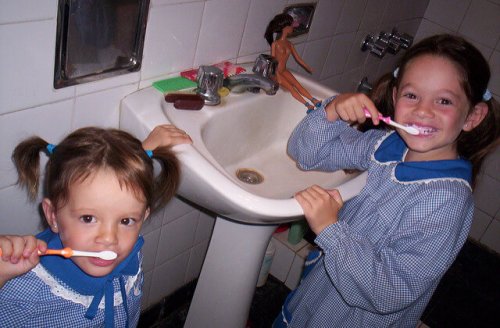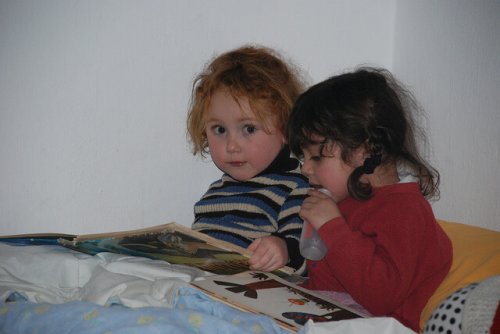The Importance of Your Child's Routines


Reviewed and approved by the psychologist María Alejandra Castro Arbeláez
Psychologist and mother of two little girls, Nathalie Sánchez, explains the following: routines are important, but strict timing is not.
Can schedules be flexible? She responds: Encouraging flexibility is important because it gives you the ability to adapt.
We need to be able to adapt to an ever-changing world by being flexible in our structures, especially mental ones.
“Life is change,” Buddhists say, and we should prepare our children for it.
Sánches says that some people confuse routines with schedules, and they are not the same. The important thing, she says, is for our children to understand the concept of time. They don’t know what a half hour or an hour is yet.
Having a routine will help them know what to do after each task or specifically what will happen after each activity.

Routines offer stability
“Children don’t have an exact notion of how each day occurs. When they have routines, they can understand what will happen,” she explains.
For example, with a general routine, a child can know that first, they get up. Then they wash their face and brush their teeth. Then they eat and later go to school.
With this general routine, the child will be able to anticipate what will happen next.
And if your child has an idea of what happens after each thing, they will feel stable and safe.
“Children, when they get anxious, give their parents the impression that they are behaving poorly. Really what is happening is they don’t understand what they should and shouldn’t do,” she says.
For example, Sánches says that for children who are used to taking a bath every night before bed, during bath time they know they are approaching bedtime.
They don’t have plans to play, watch television, or start other activities. They know that they can anticipate that every night after taking a bath, they go to bed.
A psychology article reinforces what Sánchez says: Children need to follow a routine to feel safe and calm in their environment.

Routines help them to identify
The article also emphasizes that if we establish routines, children will learn that each activity has its time and place. With repetition, they will begin to be able to regulate their own routines.
Your child will be capable of thinking: “I don’t get up from the table to play because I know that there will be time later for this. I have to tidy the toys I have used before taking a bath….”
This helps them to better understand their environment. It also allows them to develop their self-control and independence.
Habits are a learning tool. They aren’t immediate. They are learned through repetition and practice.
If we keep in mind the time needed to learn a new routine, it will be easier to have the patience to help our child adjust to it.
On the other hand, if we lose hope and we demand more than what our child can give us, we may be creating a negative experience for them that they won’t want to repeat.
Here are a few other pieces of advice when we are trying to teach our children:
- Don’t give contradicting orders
- If you tell your child to shower, tidy up their room, and wait at the table, without telling them the order, they will ignore you. Give them the first step. When they have completed it, the second. If your child is old enough to memorize orders, spell them out and tell them which ones are a priority. Don’t wait for them to figure it out, because you have your own priorities.
Psychologist and mother of two little girls, Nathalie Sánchez, explains the following: routines are important, but strict timing is not.
Can schedules be flexible? She responds: Encouraging flexibility is important because it gives you the ability to adapt.
We need to be able to adapt to an ever-changing world by being flexible in our structures, especially mental ones.
“Life is change,” Buddhists say, and we should prepare our children for it.
Sánches says that some people confuse routines with schedules, and they are not the same. The important thing, she says, is for our children to understand the concept of time. They don’t know what a half hour or an hour is yet.
Having a routine will help them know what to do after each task or specifically what will happen after each activity.

Routines offer stability
“Children don’t have an exact notion of how each day occurs. When they have routines, they can understand what will happen,” she explains.
For example, with a general routine, a child can know that first, they get up. Then they wash their face and brush their teeth. Then they eat and later go to school.
With this general routine, the child will be able to anticipate what will happen next.
And if your child has an idea of what happens after each thing, they will feel stable and safe.
“Children, when they get anxious, give their parents the impression that they are behaving poorly. Really what is happening is they don’t understand what they should and shouldn’t do,” she says.
For example, Sánches says that for children who are used to taking a bath every night before bed, during bath time they know they are approaching bedtime.
They don’t have plans to play, watch television, or start other activities. They know that they can anticipate that every night after taking a bath, they go to bed.
A psychology article reinforces what Sánchez says: Children need to follow a routine to feel safe and calm in their environment.

Routines help them to identify
The article also emphasizes that if we establish routines, children will learn that each activity has its time and place. With repetition, they will begin to be able to regulate their own routines.
Your child will be capable of thinking: “I don’t get up from the table to play because I know that there will be time later for this. I have to tidy the toys I have used before taking a bath….”
This helps them to better understand their environment. It also allows them to develop their self-control and independence.
Habits are a learning tool. They aren’t immediate. They are learned through repetition and practice.
If we keep in mind the time needed to learn a new routine, it will be easier to have the patience to help our child adjust to it.
On the other hand, if we lose hope and we demand more than what our child can give us, we may be creating a negative experience for them that they won’t want to repeat.
Here are a few other pieces of advice when we are trying to teach our children:
- Don’t give contradicting orders
- If you tell your child to shower, tidy up their room, and wait at the table, without telling them the order, they will ignore you. Give them the first step. When they have completed it, the second. If your child is old enough to memorize orders, spell them out and tell them which ones are a priority. Don’t wait for them to figure it out, because you have your own priorities.
All cited sources were thoroughly reviewed by our team to ensure their quality, reliability, currency, and validity. The bibliography of this article was considered reliable and of academic or scientific accuracy.
- Tello, M. (2016). Beneficios de los hábitos y rutinas en niños. [online] Panorama. Disponible en: https://www.panorama.com.ve/pitoquito/Beneficios-de-los-habitos-y-rutinas-en-ninos-20161011-0063.html
- Arrieta Núñez, J., Iturri Lucero, A., & Santibáñez Monsalve, C. (2018). Relación entre rutinas familiares y desarrollo de Funciones Ejecutivas en niños y niñas de 5 y 6 años de edad de tres colegios de tipo particular pagado, particular subvencionado y municipal de las regiones Metropolitana y de Valparaíso en 2017. http://repositorio.umayor.cl/xmlui/handle/sibum/6082
- Migliorini, L., Cardinali, P., & Rania, N. (2011). La cotidianidad de lo familiar y las habilidades de los niños. Psicoperspectivas, 10(2), 183-201. https://scielo.conicyt.cl/scielo.php?pid=S0718-69242011000200009&script=sci_arttext
- Prado Borja, C. (2014). La importancia de las rutinas en niños de educación inicial de 3 a 5 años (Bachelor’s thesis, Quito, 2014). http://repositorio.usfq.edu.ec/handle/23000/3316
This text is provided for informational purposes only and does not replace consultation with a professional. If in doubt, consult your specialist.








